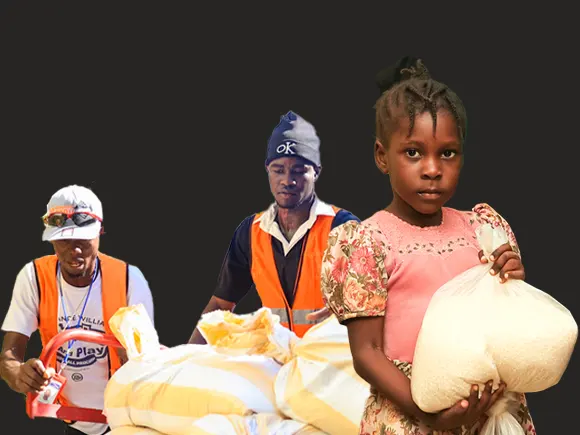FFP Inaugurates Sustainability Projects in Guatemala
COCONUT CREEK, Fla. (November 4, 2008) – During the week of October 13, 2008, Food For The Poor (FFP) inaugurated a series of aquaculture projects in multiple locations across Guatemala. The multi-pond tilapia farm projects were completed jointly with the Taiwan International Cooperation and Development Fund (ICDF), Lutheran Council and Caritas Arquidiocesana.
Food For The Poor, with the assistance of the ICDF, has implemented the Tilapia Farm Program, a self-sustaining fish farming initiative specifically designed to enhance food production in countries that are food insecure. The program will produce a nutritional source of food to combat hunger and reduce malnutrition, and will encourage economic sustainability with a viable and marketable product.
“One of the best ways to help the poor is to empower them to help themselves,” said Angel Aloma, executive director of Food For The Poor. “To help break the cycle of poverty, Food For The Poor has developed long-term, sustainable solutions to improve the economic situations of poor communities. With a combination of educational, reliable facilities and self-help programs, we can break the cycle of poverty that keeps the poor from achieving self-sufficiency.”
The Tilapia Farms in the Santa Rosa region of Hawaii and Monterrico consist of a total of 15 ponds that were excavated near the Pacific coast – five ponds in Hawaii and 10 ponds in Monterrico. The people of Hawaii are genuinely grateful for the economic opportunity the five tilapia ponds will provide.
Five of the 10 ponds in Monterrico are part of a Women’s Tilapia Development project. The women in Monterrico have created an association, similar to the men, to ensure the tilapia are nurtured, harvested and sold to benefit the entire community. The ponds benefit the families involved economically, and also contribute to the nutritional intake of the surrounding communities. This project solves two of the community’s problems – lack of food and a viable source of income.
Cilsa Pérez, president of the Women’s Association in Monterrico, said the community is grateful to God, and those He selects to donate to Food For The Poor. The tilapia farm has lifted up the community and shown the people that it is possible for them to make a living honorably.
To reach the five tilapia ponds in El Tabacal, representatives from Food For The Poor, ICDF and Caritas crossed four rivers and drove high into the remote mountains. The 47 families that reside in El Tabacal are of Mayan ancestry, and continue to pay the price of the Guatemalan Civil War – the longest civil war in Latin American history. After the 36-year war ended in 1996, and their lands were legally taken from them, they were forced to relocate to El Tabacal. This area is known for the exploitation of women and children by construction companies, who pay little for their manual work. The five tilapia ponds in El Tabacal are spring fed, maximizing the natural oxygen flow in the pools, keeping the fish healthy and tasty.
Juanito Ruiz, president of the Men’s Association in El Tabacal, graciously thanked Food For The Poor donors, the ICDF experts and Caritas for the tilapia ponds and water project. Ruiz said the residents of El Tabacal are strong, hardworking people, who are thankful to God for providing them with a way to feed their families and to pay the government its land fees. Juana Chech, president of the Women’s Association in El Tabacal, reiterated their thanks for the self-sustaining tilapia ponds. She said that before they had nothing and now, thanks to God, they have food and safe, clean drinking water. The men, women and children are grateful they no longer have to wash their clothes in the contaminated river.
The objective of the16 tilapia pools in Retalhuleu, Guatemala, is for each pool to generate about 5,000 pounds of tilapia per harvest. A committee comprised of seven people will monitor and sustain the project that is expected to benefit 75 to 80 families. These pools will allow the people to produce fish, gaining them access to local and international markets. The fish will provide food for the poor and generate income among the villagers. The income generated from this project will also provide funding for disadvantaged children to attend school. Financial disparity in this region causes many children to work instead of attending school.
The Taiwan International Cooperation and Development Fund (ICDF) serves as Taiwan’s dedicated international development and cooperation organization, with a mission of “working for humanity, sustainable development and economic progress.” The ICDF shares Taiwan’s development experience with partner countries, and assists developing nations in their efforts to become self-reliant, enabling them to emerge from poverty.
Food For The Poor, the largest international relief and development organization in the nation, does much more than feed millions of hungry poor in 17 countries of the Caribbean and Latin America. Since 1982, we have provided clean water, medicines, educational materials, homes, support for orphans and the aged, skills training and emergency relief, with more than 96% of all donations going directly to programs that help the poor. For additional information please visit our Web site www.foodforthepoor.org.
Jennifer Leigh Oates
Public Relations Coordinator
954-427-2222 x 6054
jennifero@foodforthepoor.org
